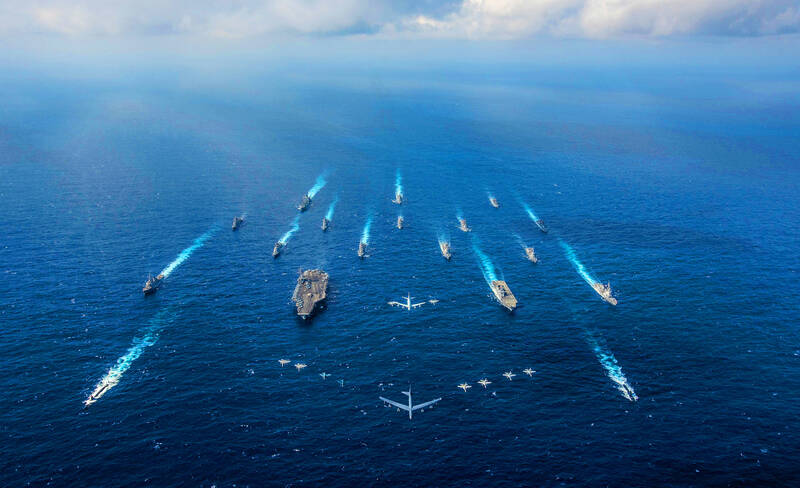A former Japanese military senior officer told Nikkei Asia that if a Taiwan crisis occurs, Japan should be prepared to take on a role like Poland in the current conflict in Ukraine, supporting Taiwan by providing arms, humanitarian relief and sanctuary to refugees.
Japan is the only country that could be the international community’s gateway to Taiwan, as the Philippines would likely decline to do so, and Australia and Hawaii are too distant, Japan Ground Self-Defense Force (SDF) retired lieutenant general Koichiro Bansho was cited as saying in an interview published on Friday.
Japan has historically accepted few immigrants and must be prepared to accept a large influx of Taiwanese, he said, adding, “We do not have a system ready to accept hundreds of thousands of refugees.”

Photo: Reuters
Bansho, who formerly commanded Japan’s Western Army, tasked with the defense of Kyushu and Okinawa, said that Japan should probably not take on a combat role in a conflict across the Taiwan Strait.
“The greatest contribution Japan can make is to properly defend itself,” he said.
Due to Japan’s strategic position, the country could cause enormous military challenges for China by defending key chokepoints, Bansho said.
“China has nine exit points to the outer seas, and five of those are located in the Japanese archipelago,” he said.
The five access points in Japan refer to the Tsugaru Strait, Osumi Strait, Yokoate Channel, Miyako Strait and Yonaguni Channel.
“One of Japan’s strategies is to impose costs on the opponent,” Bansho was quoted as saying. “If mines were scattered in the waters, it would be a hassle to remove them. If anti-air defenses were deployed, it would be very difficult to establish air superiority.”
Japanese armed forces would not fight in Taiwan itself, he said.
“The main areas of the SDF’s activity will be in Japanese territory and perhaps international waters to protect Japanese ships, Nikkei quoted him as saying.
“A scenario in which the SDF will go onto Taiwanese land and defend Taipei alongside the US, for instance, is not expected,” he said.

Alain Robert, known as the "French Spider-Man," praised Alex Honnold as exceptionally well-prepared after the US climber completed a free solo ascent of Taipei 101 yesterday. Robert said Honnold's ascent of the 508m-tall skyscraper in just more than one-and-a-half hours without using safety ropes or equipment was a remarkable achievement. "This is my life," he said in an interview conducted in French, adding that he liked the feeling of being "on the edge of danger." The 63-year-old Frenchman climbed Taipei 101 using ropes in December 2004, taking about four hours to reach the top. On a one-to-10 scale of difficulty, Robert said Taipei 101

Taiwanese and US defense groups are collaborating to introduce deployable, semi-autonomous manufacturing systems for drones and components in a boost to the nation’s supply chain resilience. Taiwan’s G-Tech Optroelectronics Corp subsidiary GTOC and the US’ Aerkomm Inc on Friday announced an agreement with fellow US-based Firestorm Lab to adopt the latter’s xCell, a technology featuring 3D printers fitted in 6.1m container units. The systems enable aerial platforms and parts to be produced in high volumes from dispersed nodes capable of rapid redeployment, to minimize the risk of enemy strikes and to meet field requirements, they said. Firestorm chief technology officer Ian Muceus said

MORE FALL: An investigation into one of Xi’s key cronies, part of a broader ‘anti-corruption’ drive, indicates that he might have a deep distrust in the military, an expert said China’s latest military purge underscores systemic risks in its shift from collective leadership to sole rule under Chinese President Xi Jinping (習近平), and could disrupt its chain of command and military capabilities, a national security official said yesterday. If decisionmaking within the Chinese Communist Party has become “irrational” under one-man rule, the Taiwan Strait and the regional situation must be approached with extreme caution, given unforeseen risks, they added. The anonymous official made the remarks as China’s Central Military Commission Vice Chairman Zhang Youxia (張又俠) and Joint Staff Department Chief of Staff Liu Zhenli (劉振立) were reportedly being investigated for suspected “serious

American climber Alex Honnold is to attempt a free climb of Taipei 101 today at 9am, with traffic closures around the skyscraper. To accommodate the climb attempt and filming, the Taipei Department of Transportation said traffic controls would be enforced around the Taipei 101 area. If weather conditions delay the climb, the restrictions would be pushed back to tomorrow. Traffic controls would be in place today from 7am to 11am around the Taipei 101 area, the department said. Songzhi Road would be fully closed in both directions between Songlian Road and Xinyi Road Sec 5, it said, adding that bidirectional traffic controls would